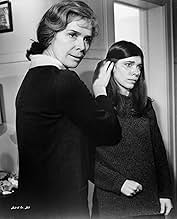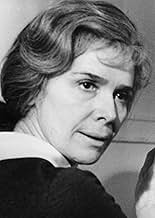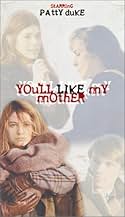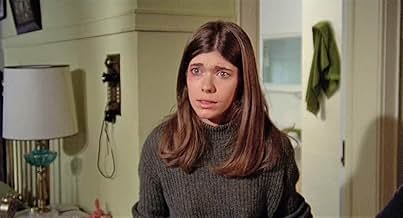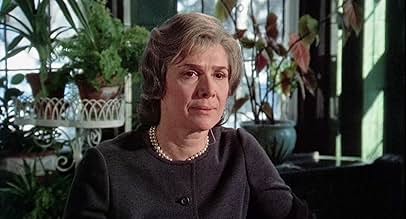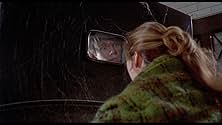Ajouter une intrigue dans votre langueA pregnant Vietnam War widow visits her mother-in-law in Minnesota during a blizzard. Trapped by snow, she discovers disturbing family secrets, including an escaped mentally ill brother-in-l... Tout lireA pregnant Vietnam War widow visits her mother-in-law in Minnesota during a blizzard. Trapped by snow, she discovers disturbing family secrets, including an escaped mentally ill brother-in-law hiding in the house.A pregnant Vietnam War widow visits her mother-in-law in Minnesota during a blizzard. Trapped by snow, she discovers disturbing family secrets, including an escaped mentally ill brother-in-law hiding in the house.
- Réalisation
- Scénario
- Casting principal
- Récompenses
- 1 nomination au total
Avis à la une
When her Army husband is killed in combat, a pregnant Patty Duke travels to the remote Minnesota home of his family, whom she's never met, for a visit. Meeting with icy acceptance from mother-in-law Rosemary Murphy and stranded by a blizzard, Duke begins to discover terrifying--and deadly--secrets about her husband's family.
I wish had known about this film before I had been in Duluth many years ago. The movie was shot in the Congdon Mansion, and it would have been fun to visit the building, even if I was not allowed inside.
Well played, Scream Factory, for giving this one a release. I had not heard of it, and based on the few IMDb reviews, it seems I am not alone. Despite being a Universal film, it seems to have been very understated, with few "names" attached. Was it made for TV originally? I am surprised by how well the protagonist takes her situation -- a more modern version would have her being terrorized.
I wish had known about this film before I had been in Duluth many years ago. The movie was shot in the Congdon Mansion, and it would have been fun to visit the building, even if I was not allowed inside.
Well played, Scream Factory, for giving this one a release. I had not heard of it, and based on the few IMDb reviews, it seems I am not alone. Despite being a Universal film, it seems to have been very understated, with few "names" attached. Was it made for TV originally? I am surprised by how well the protagonist takes her situation -- a more modern version would have her being terrorized.
Heavily pregnant widow Francesca Kinsolving (Patty Duke) travels to snowy Minnesota to meet her mother-in-law Maria for the first time. However, on arrival at the remote Kinsolving estate, she is shocked to find that the woman (Rosemary Murphy) isn't as saintly as her husband described (nice old ladies don't drown kittens!). When a snowstorm prevents her from leaving, Francesca finds herself a virtual prisoner in the house, and discovers a secret that puts not just her life in danger, but that of her child as well.
A taut thriller with bags of atmosphere and great performances, You'll Like My Mother could have been a classic, if it wasn't for one dodgy plot point that undoes a lot of the good work done by director Lamont Johnson and his talented cast. Without giving too much away, the effectiveness of the film as a whole depends a lot on the silence of a baby; silence when it is born, and silence for the following few days. In my experience, newborns do the exact opposite - they cry a lot - but Francesca's bundle of joy doesn't even gurgle or coo. As the script requires, the tiny tot stays schtum. It's just a tad far-fetched as far as I am concerned, and prevents the film from being a complete success.
Still, even with this somewhat irksome plot contrivance, I enjoyed this slow-burn thriller for its wonderfully chilling wintry locale, smart direction (Johnson makes great use of the old house), and solid acting (Duke and Murphy are given able support from Sian Barbara Allen as mentally disabled Kathleen, and Richard 'John-Boy Walton' Thomas as sexual sadist Kenny, the other occupants of the sprawling Kinsolving manor).
A taut thriller with bags of atmosphere and great performances, You'll Like My Mother could have been a classic, if it wasn't for one dodgy plot point that undoes a lot of the good work done by director Lamont Johnson and his talented cast. Without giving too much away, the effectiveness of the film as a whole depends a lot on the silence of a baby; silence when it is born, and silence for the following few days. In my experience, newborns do the exact opposite - they cry a lot - but Francesca's bundle of joy doesn't even gurgle or coo. As the script requires, the tiny tot stays schtum. It's just a tad far-fetched as far as I am concerned, and prevents the film from being a complete success.
Still, even with this somewhat irksome plot contrivance, I enjoyed this slow-burn thriller for its wonderfully chilling wintry locale, smart direction (Johnson makes great use of the old house), and solid acting (Duke and Murphy are given able support from Sian Barbara Allen as mentally disabled Kathleen, and Richard 'John-Boy Walton' Thomas as sexual sadist Kenny, the other occupants of the sprawling Kinsolving manor).
Filmed in the woods of Minnesota this thriller is scary and exciting! Patty Duke delivers a great performance but is at times outshined by newcomer Sian Barbara Allen! Sort of bloody at times! Richard Thomas in a rare performance as a physcho! Excellent film to watch on a cold winter night!
There are a couple of things to recommend this picture. First there is the snow: a LOT of snow, which adds to the claustrophobic atmosphere. Also a truly creepy performance by Richard Thomas (pre Waltons) as Kenny. Just the way he refers to himself in the third person is more effective than a hundred stabs of a knife. A good rental but not as bloody as genre fans might like.
"You'll Like My Mother" is reminiscent in terms of subject matter to the British, Hammer-produced thriller "Die! Die, My Darling", as both movies deal with a recently widowed women acquainting their mothers-in-law only after the husbands' deaths and almost literally ending in hell. And since "Die! Die, My Darling" was such an absorbing and creepy little thriller; I really wanted to check out this movie as well, particularly because this is an "Americanized" 70's version with exploitation undertones and complementary raw atmosphere. Francesca, eight months pregnant and widowed since seven months as she lost her husband Matthew when his plane crashed in Vietnam, travels all the way up to Matthew's parental house to pay an unannounced visit to his mother. From the very first minute, Mrs. Kinsolving turns out to be hateful and cynical person who hasn't got the slightest intention to get friendly with Francesca or the baby. But there's more, as Matthew mute and mentally underdeveloped sister Kathleen – whom Francesca never heard about before – seems petrified of the mother and slips bizarre little newspaper clippings into her hands like she's trying to warn her about something sinister. With the snowy weather getting worse, Francesca and her unborn child are trapped in a mansion with a potentially very dangerous psychopath. "You'll Like My Mother" is a very tense and unnerving 70's thriller with a solid script that gradually becomes more convoluted through effective twists and a couple of powerful moments that are simultaneously disturbing and saddening. Particularly halfway through the movie, the story becomes unusual and nightmarish (all comparisons with "Die! Die, My Darling" abruptly end at that point as well) and you'll need a very strong nerve system to make it through some of the sudden twists. This movie is another perfect example to show you don't necessarily require a big budget to deliver a spine-chilling thriller. "You'll Like My Mother" contains no special effects or particular gimmicks, but thrives exclusively on dreary atmosphere and offbeat plotting. It's an incomprehensibly underrated 70's highlight with great acting performances (Patty Duke is sublime as the mother in distress) that urgently needs a much wider audience.
Le saviez-vous
- AnecdotesFilmed at the Congdon Mansion in Duluth, MN. After the murder of mansion owner and prominent heiress Elisabeth Congdon in 1977, a movie theatre in Duluth revived the movie at midnight showings (much to the chagrin of the Congdon family).
- Crédits fousThe closing credits roll down instead of up.
- ConnexionsFeatured in Beata Virgo Viscera (2018)
Meilleurs choix
Connectez-vous pour évaluer et suivre la liste de favoris afin de recevoir des recommandations personnalisées
Détails
- Date de sortie
- Pays d’origine
- Langue
- Aussi connu sous le nom de
- Visita del terror
- Lieux de tournage
- Sociétés de production
- Voir plus de crédits d'entreprise sur IMDbPro
- Durée
- 1h 32min(92 min)
- Rapport de forme
- 1.85 : 1
Contribuer à cette page
Suggérer une modification ou ajouter du contenu manquant





